Hispanic Heritage Month: Getting to Know our Local Hispanic American Judges
Hispanic Heritage Month: Getting to Know our Local Hispanic American Judges
Hispanic Heritage Month began in 1968 as a weeklong celebration and was expanded in 1988 to a month-long observance from September 15 through October 15. In addition to recognizing independence of several Latin American countries (Costa Rica, El Salvador, Guatemala, Honduras and Nicaragua on September 15) as well as Mexico and Chile (September 16 and 18 respectively), it now includes the opportunity to celebrate Hispanic culture and achievement while also recognizing the ways in which the nation is enriched by its Hispanic American citizens.
This year in honor of National Hispanic Heritage Month, RumbergerKirk asked a few of our local Hispanic American judges to share their background, some of their favorite traditions, how their culture has influenced their career and life and the importance of celebrating Hispanic Heritage Month. Each week we will add a new judge’s answers.
The Honorable Gisela T. Laurent, Ninth Judicial Circuit of Florida
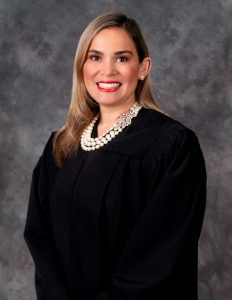
- Tell us about your background and culture.
I am a first generation American—born in Cleveland, Ohio. My parents are from the Dominican Republic; they both immigrated to the US in the early 1970’s arriving in New York City.
My Dominican culture is vibrant and close knit; We routinely gather our large families to eat, dance, play dominoes, and tell old stories.
- What is your favorite tradition from your culture?
The cooking in the Dominican culture is phenomenal! I love getting together for the holidays and everyone bringing food pot luck style. Additionally the families will dance all night to work off the feast.
- How has your culture impacted your career?
My culture has made it in the United States because of our strong work ethic. My culture has taught me not to take time for granted and to work hard for what you need to provide for your family.
- Why is it important to celebrate Hispanic Heritage Month?
It is important to celebrate HHM because it highlights and appreciates the impact that our Hispanic heritage has had in our everyday American environment; it is important for our community to recognize that we are better when we draw on the diverse perspectives and backgrounds of all people who make up our community.
- Why are “firsts” important to note? What barrier breakers have you witnessed in your career?Sometimes people need to see that the impossible is possible. Highlighting the “first” gives hope and enlightens those who may have similar dreams and goals.
I was the first Latina to win an election for the Ninth Circuit County Court bench in Florida history and the first female Hispanic to be appointed to the circuit court bench; I honor these achievements because they inspire, motivate, and serve as an example of what we are capable of when we work hard. I love serving as a mentor to young Hispanic attorneys with my similar background and upbringing. I want to stand by their side as they continue to break barriers and represent our culture.
- What advice do you have for upcoming generations of Hispanic lawyers?
Never forget or take for granted the sacrifices that were made to get you where you are today; Honor those sacrifices by continuing to work hard and by paying your experiences forward!
- What are ways you feel the legal industry can encourage and grow the number of Hispanic attorneys?
By being engaged in the middle schools and high schools. Our children need to see the journey, we need to be the light!
The Honorable Robert F. Diaz, Seventeenth Circuit of Florida
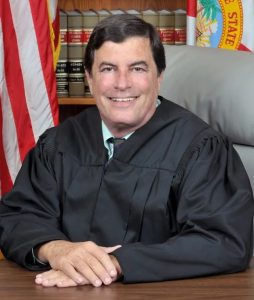
Judge Diaz has served in the Criminal Division of the County Court in Broward for 26 years and is a long time professor at Nova Southeastern University as an Adjunct Professor. Through the years, he has been committed to helping Hispanic lawyers and students in the Broward County community through mentoring and providing networking opportunities.
- Tell us about your background and culture.
I am the son of Cuban parents who came from Cuba in 1948. I was born in Coral Gables Florida in 1953. I was raised in the Cuban culture in Hialeah, Florida and was surrounded by aunts and uncles from Cuba. In 1959 more relatives came and I met my cousins and other related family members. I love my Cuban culture and my heritage. I take great pride in my heritage and have read many books about Cuba and visited Cuba on a cruise ship in March of 2020. - How has your culture impacted your career?
I was the first Hispanic judge in Broward County in 20 years when I was appointed in July of 1992. Being Cuban was much discussed during my campaign for judge in 1992 as I was appointed by Governor Lawton Chiles and had an immediate election. There were not many Hispanic names on the ballot that year. Therefore, I spoke a lot about how great this country was because my mother and father taught me you can do and be anything you choose in this country. - Why is it important to celebrate Hispanic Heritage Month?
We need to celebrate Hispanic Heritage Month not only to recognize our culture and our leaders, but to let everyone know we are together as a community and can use our mutual heritage to achieve much for others in the Hispanic Community. - Why are “firsts” important to note? What barrier breakers have you witnessed in your career?
Once there is a “first” a second, third, fourth, and so on, more is easier to achieve. I have seen more Hispanics come into the judiciary since I became a judge in Broward County, and we now are at number 14, I believe. - What advice do you have for upcoming generations of Hispanic lawyers?
Hispanic lawyers have a path they can follow if they choose. They should embrace all their legal knowledge and their cultural trait of being warm, intelligent, hardworking, and inclusive of everyone. Always be prepared in your legal work, and respectful in all your dealings with everyone in the courthouse. - What are ways you feel the legal industry can encourage and grow the number of Hispanic attorneys?
We can hold Hispanic Heritage Month events, visit middle schools and high schools so young people see Hispanics as lawyers and judges. We should mentor as many young people as we can. We can show them it can be done, you just have to use your natural Hispanic culture traits of being hard working, caring, honest and sincere. Hispanics should not offer a handout, but a hand up.
The Honorable Tarlika Nunez-Navarro, Ninth Judicial Circuit of Florida
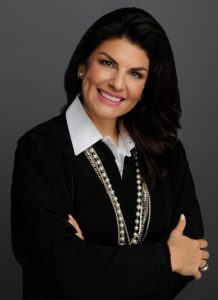
Public service is deeply imbedded in Judge Nunez-Navarro whose father, a doctor, taught her the importance of supporting your community. Judge Nunez-Navarro was appointed to the Seventeenth Circuit Bench in 2018 and then to the Ninth Circuit Bench in 2021. She currently serves in the Circuit Criminal Division.
- Tell us about your background and culture.
My father is from Colombia and my mother is a 5th generation Floridian. I was born and raised in Lake Placid, a small rural farm town in Florida. - What is your favorite tradition from your culture?
Definitely eating and dancing with my family. - How has your culture impacted your career?
My Colombian heritage has taught me the importance of hard work, perseverance, and adherence to the rule of law. - Why is it important to celebrate Hispanic Heritage Month?
It’s important to take time to celebrate our ancestors who gave up so much for us to be able to live in a free and welcoming nation where laws, and our independent court system, ensure our freedom and all of fundamental rights. - Why are “firsts” important to note?
Firsts are not personally important to me; however, “firsts” often are an indicia of progress in an area where a particular group is often underrepresented or underserved. I have had the privilege and honor of being the first Colombian woman to be appointed in two of Florida’s busiest judicial circuits. Hopefully, this will inspire others to follow their dreams. - What advice do you have for upcoming generations of Hispanic lawyers?
Treat the law as a vocation not merely a job. Follow your passion and heart, never the money. Serve in some form of service to your community and never forget where you came from. - What are ways you feel the legal industry can encourage and grow the number of Hispanic attorneys?
Hire young Hispanic lawyers. Mentor and inspire them into positions of leadership.
The Honorable Luis F. Calderon, Ninth Judicial Circuit of Florida
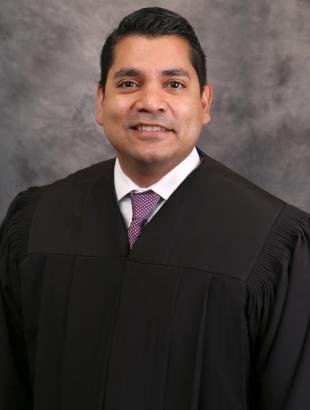
Judge Calderon was appointed to the Circuit bench in 2017 and currently serves as the Associate Administrative Judge for the Circuit Criminal Division. Coming from Nicaragua during a period of unrest and revolution, his parents taught him that education is one thing that can never be taken from you.
- Tell us about your background and culture.
I was born in Panama, my mother is Panamanian and my father is Nicaraguan. - What is your favorite tradition from your culture?
The food! Food is a big part of Hispanic culture, it can define a holiday, be the pretext for an impromptu family get together, and is often the passing on of tradition in simply sharing a recipe. - How has your culture impacted your career?
Being an immigrant and being Hispanic has impacted pretty much every aspect of my life. As far as my career, it has ingrained in me a work ethic, a desire to contribute to the community and make a difference. I take nothing for granted and try to make use of every opportunity that has been presented to me. In my opinion, these are qualities that are particularly strong in the Hispanic culture, and for immigrants as well. - Why is it important to celebrate Hispanic Heritage Month?
It is important to celebrate all the contributions made by all different groups of people who have emigrated to this country and made it their home. For me, Hispanic Heritage Month reminds me of how far back those contributions date back, and how interwoven Hispanics are into this great tapestry of diversity that is America.
When I see someone that I can identify with, either culturally or otherwise, and knowing that person achieved great things despite their circumstances, it is inspiring. I believe that months like Hispanic Heritage Month serves to inspire all of us to achieve greatness, and to recognize that without the struggle of those that came before us, it would be a much more difficult path. This month gives us an opportunity to reflect and show gratitude for those Hispanic trailblazers and to uplift those who are aspiring to do great things, regardless of their background. When I see others celebrating my diversity and recognizing the achievements of Hispanics, it fills me with a sense of orgullo, not only of being Hispanic, but to be part of a community that recognizes and values the importance of diversity. - Why are “firsts” important to note? What barrier breakers have you witnessed in your career?
Firsts are important because it proves that it can be done. Despite whatever barriers existed, it can be achieved. We recognize firsts because we realize that the circumstances were such that it was unimaginable or unlikely that a person could do it. I think if we fail to acknowledge the difficulty in being the first, the weight that it carries, and through them, the legacy that is created, we may take it for granted and get complacent. There are still so many barriers to overcome and hopefully more firsts to come.
Two notable firsts that come to mind are Alberto Gonzales, the first Hispanic Attorney General, and the highest ranking Hispanic member of the executive branch to date, and Justice Sonia Sotomayor, the first Hispanic Supreme Court Justice. - What advice do you have for upcoming generations of Hispanic lawyers?
Find a good mentor who you feel reflects where you want to be later in your career. Set a good example, consider becoming a mentor when the time is appropriate, and pay it forward.
The Honorable Bertila Soto, Eleventh Judicial Circuit of Florida
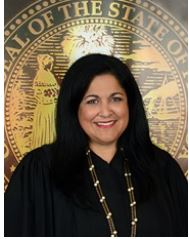
In 2013, Judge Soto became the first female Chief Judge of the Eleventh Judicial Circuit of Florida, which serves Miami-Dade County, as well as the first Hispanic and the first Cuban-American in that role. She currently serves in the probate division as a circuit judge.
- Tell us about your background and culture.
I am the daughter of Cuban parents from Spanish descendants, I was born in the United States. - What is your favorite tradition from your culture?
I love everything about my culture. My parents taught me to love their heritage. It’s a part of my everyday life. I feel blessed to live in a county – a country that encourages and allows us all to be ourselves. - How has your culture impacted your career?
As the daughter of immigrants it was important for my family to give back to this country. My father had been a lawyer in Cuba and encouraged my brothers and I to reach for our dreams. My dream was to follow in my father’s footsteps; and choose a career that defended the very rights he left Cuba for. I think it is that drive that is instilled in so many of us that makes the person/judge I am today. - Why is it important to celebrate Hispanic Heritage Month?
I think it reminds all of us, not just Hispanics, how wonderful this country is and how welcoming it is to all cultures. Embracing differences in a positive light is one of the most precious parts of being American. - Why are “firsts” important to note? What barrier breakers have you witnessed in your career?
Firsts, are important because they show opportunity. Firsts inspire those that feel they may not be able to achieve their dreams that they are possible. I was lucky enough to be a first, as the first woman and first Hispanic Chief Judge of Miami Dade County. I hope that shows those who come into our field that opportunity for everyone exists in our county. I owe that first to organizations like FAWL, CABA, the Florida Bar and many others who have encouraged the discussion of inclusivity in the legal profession. - What advice do you have for upcoming generations of Hispanic lawyers?
The advice I will give to upcoming generations of lawyers is work hard and dream big. This profession is so important and rewarding when done right. I love being a lawyer. - What are ways you feel the legal industry can encourage and grow the number of Hispanic attorneys?
It isn’t very hard to find excellent Hispanic attorneys. Opportunity for everyone is important. The doors should be open for all lawyers regardless of their background. We have come a long way, but we can do better.